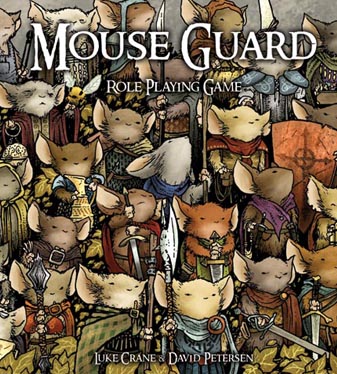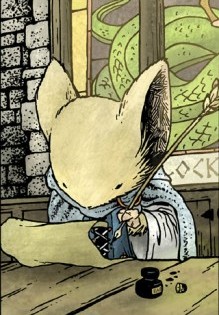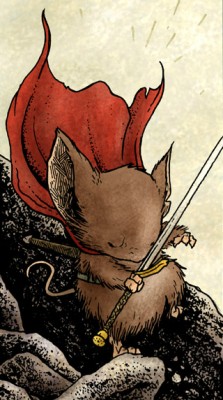You Should Be Playing…
Mouse Guard Roleplaying Game
Life as a mouse in the world is not an easy one. Even in the Mouse Territories, dangers surround them. Owls, foxes, and many other beasts would gladly feast upon them. Heavy snows and sudden thaws could crush or flood a burrow in a day. A few years ago, the Kingdom of Weasels invaded the Mouse Territories with every intention of enslaving the mice as labor and food. It would take a truly brave mouse to face down any single one of these threats. For the heroes of the Mouse Guard, however, these threats are what they must fight every day.
 Mouse Guard Roleplaying Game is based on the Eisner Award-winning series of comic books and graphic novels written by David Petersen, who assists in concept design and art for the game. Mouse Guard is written by Luke Crane, and was published in 2008 by Archaia Entertainment and Burning Wheel Headquarters. It utilizes a simplified version of the Burning Wheel system, and it received Best Role-playing Game at the 2009 Origin Awards.
Mouse Guard Roleplaying Game is based on the Eisner Award-winning series of comic books and graphic novels written by David Petersen, who assists in concept design and art for the game. Mouse Guard is written by Luke Crane, and was published in 2008 by Archaia Entertainment and Burning Wheel Headquarters. It utilizes a simplified version of the Burning Wheel system, and it received Best Role-playing Game at the 2009 Origin Awards.
The core book can be found in many gaming and book stores for its retail value of $34.95, with the MSRP for deluxe boxed set that includes several tools is $69.95. Locating the game through Amazon.com can greatly exceed these values unfortunately, though DriveThruRPG.com offers a PDF copy of the game for $19.99.
In Mouse Guard, one assumes the role of the Mouse Guard of the Territories. Tiny but brave, the Mouse Guard are the sworn protectors of the Mouse Territories, serving as traveling warriors and assistants to various cities and settlements of mice. It falls to the Mouse Guard to protect villages from marauding predators, to clear the established and safe roads between the settlements, to blaze new trails through the wilderness, and to maintain the Scent Border of the Territories which generally keeps out most of the largest predators.
The society of the Mouse Territories is a vaguely English medieval world, albeit one with anthropomorphic mice instead of humans. They forge steel, build stone walls, and conduct agriculture to provide their society with food. The mice of Lockhaven, the first major fortress of the mice, serves as the home base for the Mouse Guard, and they act as knights-errant to best protect the Territories. Each Guardmouse swears an oath of service to the Guard and to the Territories, and willfully seek out of the dangers of the world to better protect others.
 The greatest appeal of Mouse Guard is that central concept of mice acting in the way of men and overcoming their own nature in the process. Suddenly, normally harmless animals become sources of great terror and peril. The hoot of an owl is the call of a deadly predator which can swoop down at you on silent wings, and the trail of a groundhog might reveal the presence of a cunning and hungry fox.
The greatest appeal of Mouse Guard is that central concept of mice acting in the way of men and overcoming their own nature in the process. Suddenly, normally harmless animals become sources of great terror and peril. The hoot of an owl is the call of a deadly predator which can swoop down at you on silent wings, and the trail of a groundhog might reveal the presence of a cunning and hungry fox.
The nature of what makes us human grows in contrast with the nature of mice to hide, horde, and sneak. Even the seasons themselves become deadly, as a simple winter snowfall can easily be deeper than a mouse is tall.
By taking a single, simple twist on the narrative, Mouse Guard turns an ordinary world into one of heroic fantasy. While there is no magic detailed in the setting, it is most distinctly a fantasy game. It is a world where mice, weasels, and a handful of other creatures are intelligent enough to speak, reason, and develop society. Mice build cities, farm insects, and study the larger world through science and philosophy. Greatest of all, the mice are driven enough towards noble ideals that they are willing to risk their lives against impossible odds for a better tomorrow.
Gameplay
The system of Mouse Guard is a simplified variant of the Burning Wheel system, and it’s instantly recognizable to any familiar with the original. Players roll six-sided dice based on their character’s skills and abilities, with results of 4-6 succeeding. A player then tallies up their successes, and compares it to a threshold set by the Game Master. This threshold is predetermined for simple, unopposed actions, such as finding a way through heavy undergrowth or climbing a cliff. Alternatively, it may be set by a set of dice where the mouse is being actively opposed, such as in a swordfight or trying to hide from a predator. In the latter case, the GM rolls a number of dice as well, totaling up their successes and comparing it with the testing player’s results.
 Success allows for the player to describe how their Guardmouse succeeds at the task before them. Likewise, a failure permits the GM to describe how the Guardmouse fails at the task, while adding a twist to the narrative. That, or the GM may describe how they pass the challenge, but in doing so gains a condition, wherein the Guardmouse can become tired, hungry, or injured.
Success allows for the player to describe how their Guardmouse succeeds at the task before them. Likewise, a failure permits the GM to describe how the Guardmouse fails at the task, while adding a twist to the narrative. That, or the GM may describe how they pass the challenge, but in doing so gains a condition, wherein the Guardmouse can become tired, hungry, or injured.
It’s even possible in extreme cases for such an event to result in the Guardmouse’s death. However, this generally only happens after the Guardmouse has already been injured, and even then, only against truly dangerous foes. While the system clearly allows and delineates how a Guardmouse can die, the system reserves such things for dramatically appropriate moments through GM discretion. The game is only as deadly as the GM wishes it to be.
While the conditions, abilities, and skills of Burning Wheel can be very complicated, Mouse Guard moves towards greater elegance and simplicity. Guardmice only have five Abilities to keep track of, and the Skills of Mouse Guard are very straightforward. This allows the game to focus more on the heart of the narrative, and the relationships that bring a Guardmouse to life. As part of character creation, a player chooses their Guardmouse’s parents, hometown, mentor, instincts, physical appearance, and most importantly, the Belief which forms the core of their motivation. The Belief is what inspires a Guardmouse to reach their heights of heroics, defining what they fight for. Examples of this would include, “Survival is all the matters”, or, “Strength must be used to shelter the weak”. In the world of Mouse Guard, that is far more important than what a Guardmouse fights.
Short of Stature, Big of Heart
Each session of Mouse Guard is meant to be a single Mission for the patrol. Within the Mission, each Guardmouse chooses their own personal goal for the session. The GM is given a turn, creating obstacles and challenges for the Guardmice on their patrol, which deals with any number of the threats or investigations that fill the Mouse Territories. It is the purpose of the Game Master’s turn to challenge the Guardmice, to place them in danger, and to impair their well-being. Once the Guardmice either achieve their Mission, or reach a safe haven, it becomes the players’ turn. During them players take on the proactive role in the narrative, while the GM becomes reactive. Guardmice can pursue their own goals, recover from their injuries, and work towards the resolution of the session’s story.
Gameplay for Mouse Guard is very intuitive, and its narrative structure is simple, if compelling. Creating a Guardmouse for the game is nearly a story in and of itself, and players are richly rewarded for investing themselves into the narrative. As Guardmice are challenged, so can they achieve greater victories. With its visceral gameplay and approachable setting, Mouse Guard is a perfect Gateway roleplaying game, encouraging inexperienced roleplayers to participate and experiment while providing consistent challenges which can be overcome. Even for experienced roleplayers, Mouse Guard has a depth of character investment that few other games compete with. In Mouse Guard, your focus isn’t about what your perils are, but, rather, how your character approaches and ultimately overcomes them.
And that is why you should be playing Mouse Guard Roleplaying Game.
David Gordon is a regular contributor to the site. A storyteller by trade and avowed tabletop veteran, he is always on the lookout for creative tabletop games. He can be reached at dave@cardboardrepublic.com.
You can discuss this article and more on our forums!
Photo Credits: Mouse Guard images by David Petersen.
